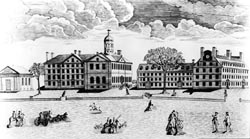
Established Nonbelief

Established Nonbelief
Founded with a specific religious purpose in mind--"to provide a learned ministry when our present ministers lie in the dust"--no one today would have religion 'in mind' as they think of Harvard.
Henry and Pauline Durant, ardent evangelical Christians, founded Wellesley College and made sure that everything about the institution "will be Christian in its influence, discipline, and course of instruction." In 1880, at the cornerstone ceremony for the college's second building, Yale president Noah Porter spoke on "The Christian College," and the Reverend S. F. Smith, author of "America," wrote a hymn, "Founded on Christ." Today, no one would call Wellesley a 'Christian college.' Such explicit religious understanding was the expressed intent for most colleges and universities.
Evidence of a religious, specifically Christian, orientation of institutions of higher learning once could be seen in chapel services. As recently as 1940, the Association of American Universities found 48 percent had compulsory chapel, 20 percent had voluntary chapel, and only 32 percent had none. Even among state schools, 27 percent still had chapel, usually voluntary. Required chapel services, integral to university life since the Middle Ages, disappeared, even in denominational colleges, in the latter twentieth century.
Not only has the pervasive influence of religion in the intellectual and cultural life of America's colleges and universities all but vanished, but religion is even held to impede honest inquiry and sound scholarship. The question that intrigued me is: how was it that this Christian 'orientation' could be so rapidly and totally displaced from the central and substantive role that it once had held in American higher education?
Certainly, the fundamentalist response to the acceptance of evolution played a role. Even today, schools are the battleground for much the controversy swirling around evolution. Surprisingly, as important, but less visible, is the part American liberal Protestantism played. It became an early sponsor of secular values--freedom, individualism, democracy, intellectualism, tolerance, and pluralism--that proved to be organizationally subversive. Such quintessentially American values all have Protestant roots, but they are also centrifugal forces where church structures and educational relationships are concerned.
Like The Charge of the Light Brigade, with the right attacking, with
the left undermining, and with the academia in front dismissing, the Christian
vision of institutions' founders faltered and fell. Moving from a
Protestant establishment to an established nonbelief has brought us many
benefits. I wonder what has been lost?